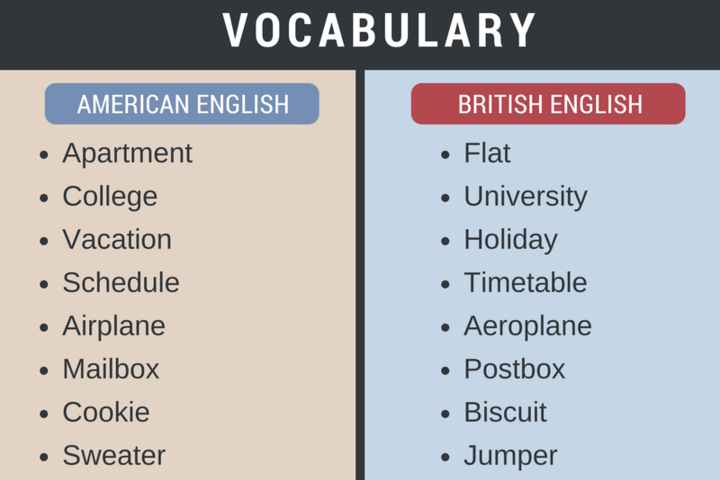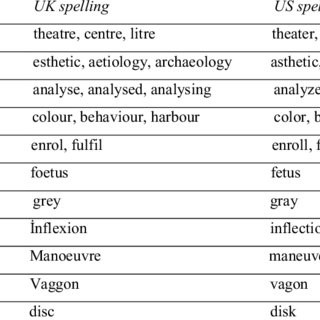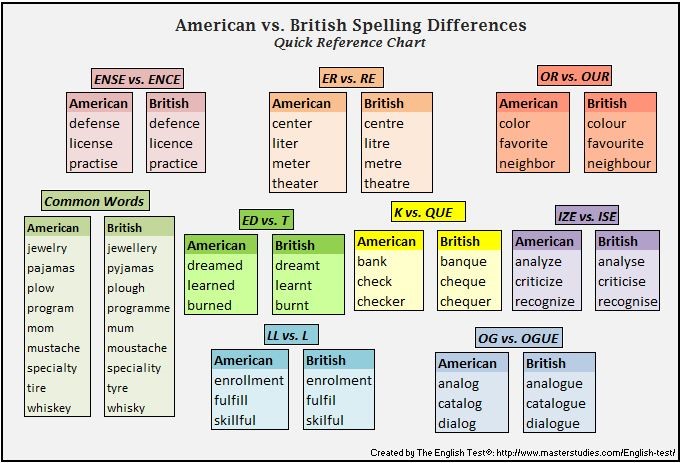Do American and British English have significant differences or are these slight accent problems? If you talk to any British, they would say, Americans don’t speak ‘REAL’ English instead it’s American English. The same is the case with Americans as well. So, who is right?
Because while speaking or listening to them both, you can’t precisely identify those differences than how this variation came into being. Let’s dig into it today and see what the actual differences between British and American English are.
British Vs. American English (Differences)
1. Vocabulary is used Differently

The first thing which you would notice as a difference between British and American English is the ‘Vocabulary’. Even everyday words are majorly different. Let’s see some of the examples.
- Kids like to eat crisps. (British English)
- Kids like to eat crisps. (British English)
- Kids like to eat crisps. (British English)
- Kids like to eat crisps. (British English)
- Kids like to eat crisps. (British English)
- Kids like to eat crisps. (British English)
So, now you would have observed that there are hundreds of everyday words that are different and are used in different ways.
2. Difference in using some Prepositions

The difference doesn’t only lie in spellings or punctuation but also in the use of prepositions as well. For example in British English, there is a sentence that athletes play in a team. Whereas in American English it would be written as that athletes play on a team. Similarly, there is a sentence that we want to enroll in a university course, but Americans would say that we want to enroll in a course. Another example is towards the lake as written in British English and toward the lake in American English. These are the main differences in the daily use of prepositions in both languages.
3. Difference in using some Irregular Verbs
The usage of past form and past participle form is different in them. For example, in British English, mostly the past and past participle of verbs are formed by adding “t” instead of “ed” to the infinitive of the verb.
The past and past participles of learned, spelled, and burned in American English are written as learned, spelled, and burnt in British English.
4. The difference in use of Collective Nouns
In British English, collective nouns take either singular or plural verb forms. Hence, the British will say and write that Napoleon’s army is on their way. In American English, all collective nouns take the singular verb form. Therefore, there it is being said that the army is on the way.
5. Difference in using Will and Shall
For the first person singular, the British like to use “shall” whereas Americans prefer “will.” Hence in British English, you say, “I shall go tomorrow,” while in American English we say, “I will go tomorrow.”
6. The difference in using Got and Have
“Got” and “have” the same meanings. In British English, it would be written as, “Have you got a book,” while in American English it would be written as, “Do you have a book?”
7. Major Spelling Differences
We all have seen the difference between color and color in different books and texts. Similarly, some people write that we go to Sports Centre for practice while others write we go to Sports Center for practice. So, what’s the difference between all of these? Are both wrong, or both are right? The difference is only between American and British English and nothing else. Both come with their own set of rules.
8. The difference in using Quotation Marks (“)
In American English, double quotation marks are always used for direct speech and emphasizing the meanings. Whereas in British English, single quotation marks are often used for different purposes. For example, in American English, a sentence that is Carefree means “free from care or anxiety.” If we have to write the same sentence in British English, it would be written as Carefree means ‘free from care or anxiety. So, the use of Quotation marks is different in both.
9. Abbreviations are Different
Forms of abbreviation are entirely different in both types of English. In American English, Mister, Misses, and Street are abbreviated Mr., Mrs., and St. with a period which comes after the abbreviation. But in British English, there is no period which comes after the abbreviations. It is easy to identify the difference between the two through this.
10. Difference of Accent is an undeniable fact

There are different dialects for English, and majorly the British and American English has the most differences. Sometimes we don’t understand every word of a movie or a song’s lyrics, and we have to take support from the subtitle thing. It’s only due to the difference in dialects.
For example the Pronunciation of the letter “r”. It can be noticed very quickly. In American English, the letter “r” is always pronounced whereas in British English it’s not pronounced. A similar case is with the Pronunciation of the letter “t”. In American English, it sounds more like “d” whereas in British English it is pronounced more clearly.
For example, the letter “r” in the word “computer” is pronounced more evident in the British version. You can easily check the difference between litter, better, and other such words. One thing more all of this is in the casual style of speaking, otherwise, Americans also try to speak as clearly as they can.
11. Dates are written in Different form
The style of writing date is different in both types of English. In American English, the month precedes the date, and this pattern is followed such as April 20, 2018, and it would be abbreviated as 4/20/18. In British English, it’s different because the date precedes the month such as 16 April 2018, and it would be abbreviated as 16/4/18. One should know both the forms to save themselves from any significant error.
12. Time is told Differently
Similarly, while telling time, there are some minor differences as well. For example, Americans say “half-past five,” for 5:30 whereas the British people will say, “half five” for the same time.
13. Is vs. –Iz
The pronunciation differences between American and British English are due to certain vowels and their way of delivering. Similarly, the difference between American and British languages for -is and –iz is realized and realize.
14. -Re vs. –Er
The pronunciation differences between American and British English are due to certain vowels and their way of delivering. Similarly, the difference between American and British language for -re and –er is centre and center.
15. –T vs. –Ed
The pronunciation differences between American and British English are due to certain vowels and their way of delivering. Similarly, the difference between American and British language for -t and –ed is learnt and learned.
16. –LL vs. –L
The pronunciation differences between American and British English are due to certain vowels and their way of delivering. Similarly, the difference between the American and British language for -ll and –l is cancelled and canceled.
17. –Our vs. –Or
The pronunciation differences between American and British English are due to certain vowels and their way of delivering. Similarly, the difference between American and British language for -our and –or is colour and color. The more we talk with people having this accent, the more we get used to it.
18. A difference in Tag questions
A tag question is a grammatical form that turns a statement into a question. For example, “You don’t like him, do you?” Americans use tag questions, too, but less often than British people.
19. –Ise vs. –Ize
The pronunciation differences between American and British English are due to certain vowels and their way of delivering. Similarly, the difference between American and British language for -ise and –ize is apologise and apologize. It’s not a very big difference only the style of speech is different. The more we talk with people having this accent, the more we get used to it.
20. –Ogue vs. –Og
The pronunciation differences between American and British English are due to certain vowels and their way of delivering. It’s not a very big difference only the style of speech is different. The more we talk with people having this accent, the more we get used to it. Similarly, the difference between American and British language for -ogue and –og is Catalog and Catalog.
21. Difference in Vowels
There is a clear difference in vowel sounds of British and American English. For example, the OH sound in British English is a UH pull kind of sound. In American English, the jaw-dropping scenes are more than the British English. Similarly, in American English, there are so many words which are having the letter “O” in them having the sound of “A” like honest, honor, etc. There are various letters and differences like this.
I had an aunt (mom’s sister) who would say “ELL” instead of “WELL”, her sister another aunt said she must be English because she doesn’t pronounce her “Hs”
British use BONNETT for HOOD and BOOT for TRUNK. But when visiting England had no problems understanding the lingo.
sloppy writing here. 5 examples, one same sentence. and learnt spelt were apparently misspelt?